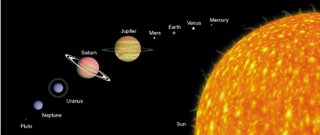
Except ... Pluto's gone!
Well, not gone ... the Lump of Rock Formerly Known As Pluto is still out there in its eccentric orbit, but a consensus of astronomers at a massive conference in Prague have demoted the lonely orb, stripping it of its planet status. It is now a "dwarf planet," and while that's not as humiliating as being relegated to asteroid status, Pluto still gets kicked out of the official planets country club, presumably along with its erstwhile friend Charon.
(Apparently, there were a lot of dissenting voices at the conference, distinguished scientists waving stuffed toys of Mickey Mouse's dog Pluto in protest.)
So what do we do with the mnemonic? Schoolchildren everywhere are distressed at the loss of their favourite underdog planet. Including this one: I myself never needed the mnemonic as a kid, not so much because I was smarter than everyone than because I was a total astronomy geek and read everything about outer space I could get my hands on. When, as a ten-year-old, you can instruct your teacher on the nature of quasars and black holes, the names of the planets are just sort of a given. I'd probably still be an astronomy geek, were it not for the harsh realization that, once past a certain level of knowledge about outer space, math gets involved in a significant way. I read A Brief History of Time in high school ... and then that was sort of that.
Until undergrad at any rate, when I took as my science requirement a course called "The Nature and Growth of Scientific Thought," taught by a grey-haired old British hippy with coke-bottle glasses, socks with his sandals, and about the driest and sharpest wit I've ever encountered in a lecturer. The first half of the course was devoted to the evolving understanding of the universe, from the ancient Babylonians to Sir Isaac Newton.
I loved it ... for some reason, my imagination was fired by the various models of the universe, from Aristotle and Ptolemy to Giordano Bruno, to the Copernican Revolution, to Galileo's persecution, to Kepler and the discovery of elliptical orbits. I devoured all the books I could find on it.
The best of these was by Arthur Koestler, titled The Sleepwalkers, which is a wonderful and incredibly lucid history of the major players in astronomy from Aristotle to Kepler. Less entertaining and more academic but still a good read is Thomas Kuhn's The Copernican Revolution, and even chunkier and more erudite, Hans Blumenberg's The Genesis of the Copernican World. There are also some brilliant fictional works that elucidate these topics, the best of them being John Banville's novels Dr. Copernicus and Kepler, both fictional biographies of the great astronomers.
Sometimes when I imagine the road not traveled, I imagine doing a dissertation on the impact of the Copernican Revolution on early modern literature ... indeed, had I decided to become a Shakespearean, that would likely have been my topic.
Ah well. This makes me want to spend the day rereading The Sleepwalkers, which unfortunately is not an option. I do think I'm going to try and find a print of the Ptolemaic solar system for my office wall, however ...
Pluto, we hardly knew ye. *sniff*

4 comments:
Man Very Early Made Jars Stand Up Neatly!!!! Ugh!! Doesn't have the same ring.
Ok you're funny. Frankly, I think I remember the BEDMUS riddle more than the one for the planets. And that's probably because I was a total star geek in elementary school as well. That is, until I took "Space Rocks for Jocks" in last year at UWO in order to meet my stupid science requirement. Why "The History of Science" was full is beyond me. However, the class was slightly interesting, until math came along to play and we had to decipher where a star was on the rotations in the galaxy and blah blah blah...I'm falling asleep just thinking about it.
Point? I agree, what is the big deal, it's a large rock orbiting the sun, can't we just give it the title "PLANET" and get it over with? Why does it all have to be so scientific??? :)
My Very Excellent Mommy Just Showed Us Nine Planets is the mnemonic that I learned (from my mum, of course!).
But, oh God! What do I do with my old IQ2000 board game???
Have you ever looked at Bill Bryson's _A Short History of Nearly Everything_? I found it very entertaining and informative. Very digestible, too.
Post a Comment